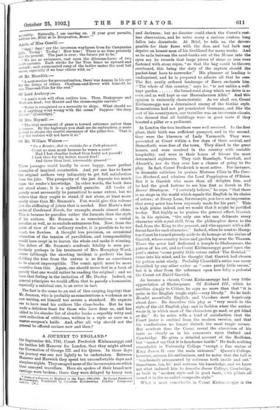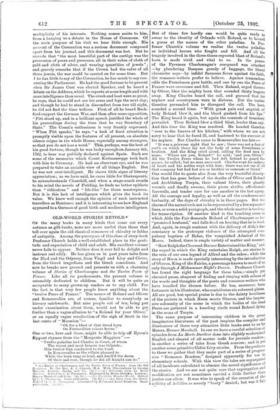A. JOURNEY TO ENGLAND.*
°N September 4th, 1761, Count Frederick Kielmansegge and his brother left Hanover for London, that they might attend the Coronation of George M. and his Queen. In those days the journey was one not lightly to be undertaken. Between Hanover and Harwich they spent ten uncomfortable days and sleepless nights. Theyescaped none of the inconveniences which then annoyed travellers. Here six spokes of their brand-new earriage were broken; there they were delayed by heavy rain rilinierW of a Journey to England an the Years 1761-1762. By Count Frederick sad numegge. Translated by Countess Ilielmansegg. London: Longman' ce [5..] and darkness; but no disaster could check the Count's rest- less observation, and he notes many a curious custom long fallen into desuetude. At Briel, he tells us, the drivers gamble for their fares with the dice, and bad luck may deprive an honest man of his livelihood for many weeks. And as he sails between the sand-banks out of the Meuse into the open sea he records that large pieces of stone or iron were fastened with stout ropes, "so that the bag could be thrown overboard, this being the duty of the captain should the packet-boat have to surrender." His pleasure at landing is undisguised, and he is prepared to admire all that he seem. The flat, neatly ordered landscape of Essex enchants him. " The whole of this country," says he, " is not unlike a well-
kept garden the broad road along which we drive is as even and as well kept as our Herrenhausen Allto." And this opinion is eminently characteristic. As we shall see, Count Kielmansegge was a determined enemy of the Gothic style. Romanticism had not yet penetrated Germany, and like the rest of his countrymen, our traveller was an inveterate °lassie, who deemed that all buildings were in good taste if they boasted a pillar or a pediment.
'In London the two brothers were well received. In the first place, their birth was sufficient passport, and in the second, they were the • kinsmen of Lady Yarmouth. They were presented at Court within a few days of their arrival, and thenceforth were free of the town. They dined in the great houses, and were received in the country with amiable hospitality, and were in their hours of leisure the most determined sightseers. They visit Ranelagh, Vauxhall, and Almack's, nor do they ever lose a chance of going to the play. In fact, Count Frederick is most active. For instance, in 'dramatic criticism he praises Mistress Clive in The Care- less Husband, and admires the Lord Foppington of O'Brien. But it is Garrick who more than all delights him, and he bad the good fortune to see him first as Scrub in The Beaux' Stratagem. "I certainly believe," he says, " that there is no stage in the world which equals the English in its choice of actors ; at Drury Lane, for example, you have an impression that every actor has been expressly made for his part." This is high praise indeed, and we would that it might be`justified to-day. But highly as he praises the general effect, Garrick is, in his opinion, "the only one who can delineate every character with equal skill, from the philosopher down to the fool, from the King to the peasant, and who appears with a dif- ferent face for each character." Indeed, when he went to Hamp- ton Court he turned piously aside to do homage at the shrine of Garrick, whose country house and garden lay near the Thames. There the actor had dedicated a temple to Shakespeare, the patron of his art, and as Count Kielmansegge gazed upon the poet's statue "some pretty little verses called The Rosciad ' " came into his mind, and he thought that Garrick had chosen his patron saint wisely. Probably Churchill's satire was never described. by.any other writer as " some pretty little verses," but it is clear from the reference upon how lofty a pedestal the Count set David Garrick.
As became a classic, Count Kielmansegge had very little appreciation. of Shakespeare. Of Richard III., which he ascribes simply to Cibber, he says no more than that "it is quite in the English tragic style,—very bloody." So he finds Hamlet essentially English. and blunders most hopelessly about Lear. He describes this play as "very much in the style of the old English play, and in fashion when the author wrote it, in which most of the characters go mad, or get blind or die." So he notes with a kind of satisfaction that the Court jester is omitted from the modern version, and that his tomfooleries no longer disturb the most tragic scenes. But nowhere does the Count reveal the classicism of his taste so clearly as in his comments upon Oxford and Cambridge. He gives a detailed account of the Bodleian, but " cannot say that it is handsome inside." He finds nothing remarkable in University College "except a fine statue of King James II. over the main entrance." Queen's College, however, arouses his enthusiasm, and be notes that the ball is " handsomely ornamented by columns both inside and out." Sometimes, too, hic zeal outruns his knowledge, and we know not what induced him to describe Jesus College, Cambridge, as built in "modern style and in good taste, with pillars all round it in.the so-called composite style."
What is most remarkable in Count Kielinansagge is the multiplicity of his interests. Nothing comes amiss to him, from a hanging to a debate in the House of Commons. Of the main purpose of his visit we hear little enough. His account of the Coronation was a serious document composed apart from his journal, and this document was lost. But he records that "the most beautiful part of the cortege was the procession of peers and peeresses, all in their robes of cloth of gold and cloth of silver, and wearing quantities of jewels"; and gravely remarks that if the Crown had the value of all these jewels, the war could be carried on for some time. But f he has little to say of the Coronation, he has much to say con- sarning the Parliament. He had the good fortune to be present Nhen Sir James Cust was elected Speaker, and he heard a lebate on the Address, which he reports at some length and with more intelligence than usual. The crush and heat were so great, he says, that he could not use his arms and legs the next day; and though he had to stand in discomfort from two till eight, he did not find the time tedious. First of all he heard Beck- ford support the German War, and then after some opposition, "Pitt stood up, and in a brilliant speech justified the whole of his proceedings during the time that he was Secretary of State." The Count's enthusiasm is very frankly expressed. " When Pitt speaks," be says, " a look of fixed attention is promptly visible upon the features of all present, an absolute silence reigns in the whole House, especially among strangers, so that you do not lose a word." This, perhaps, was the best of his good fortune, though he was lucky enough on January 4th, 1762, to hear war publicly declared against Spain. Such are some of the memories which Count Kielmansegge took back with him to Germany. He had an observant eye, and he was prepared to take an amiable view of all things English. But he was not over-intelligent. He shows little signs of literary appreciation ; as we have said, he cares little for Shakespeare, he misunderstands Churchill, and when a stage-coach recalls to his mind the novels of Fielding, he finds no better epithets than " ridiculous " and " life-like " for those masterpieces. But it is this lack of intelligence which gives the book its value. We know well enough the opinion of such instructed travellers as Hentzner, and it is interesting to see how England appeared to a German of good birth and mediocre intelligence.











































 Previous page
Previous page